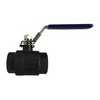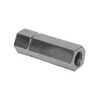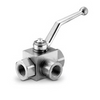Carbon Steel Valves
Choose a valve made from carbon steel when you need a material that is strong, durable, and cost-effective for use in high-pressure, high-temperature, and non-corrosive environments. AFT offers a wide selection of carbon steel valves including: ball valves, check valves, two-way & three-way valves and more.
Carbon steel is a popular choice for industrial valves because it offers a great balance of performance and price. It's an alloy of iron and carbon, and its properties make it suitable for specific applications.
-
High Strength and Durability: Carbon steel has high tensile strength, meaning it can handle significant pressure and stress without deforming or breaking. This makes it ideal for heavy-duty industrial applications like oil and gas pipelines, power plants, and refineries.
-
Cost-Effectiveness: It's generally more affordable than stainless steel and other high-performance alloys, which makes it a great option for large-scale projects where budget is a primary concern.
-
Performance in High-Temperature/High-Pressure Systems: Carbon steel is well-suited for systems that operate at high temperatures and pressures, such as steam lines, where its strength and mechanical properties are crucial for safe and reliable operation.
When to avoid carbon steel valves:
While carbon steel is excellent for many applications, it's not the right choice for every situation. Its main drawback is its susceptibility to corrosion.
-
Corrosive Environments: Carbon steel lacks the chromium found in stainless steel, which forms a protective, rust-resistant layer. Therefore, it is prone to rust and corrosion, especially when exposed to water, saltwater, harsh chemicals, or moist environments. In these cases, a stainless steel or other corrosion-resistant alloy valve would be a much better option to ensure a longer service life and prevent system failure.
-
Hygienic Applications: Industries that require sterile environments, such as food processing or pharmaceuticals, often need materials that are easy to clean and resist bacterial growth. Stainless steel is typically preferred here due to its non-porous surface and superior corrosion resistance.
-
Extreme Low Temperatures: Some grades of carbon steel can lose toughness and become brittle in very low-temperature environments, which could lead to failure. Specialized low-temperature carbon steel (LTCS) or other materials are used for cryogenic applications.



